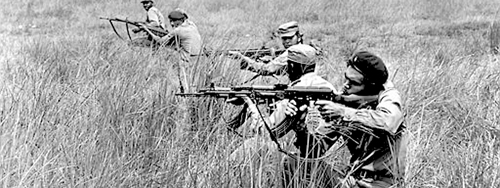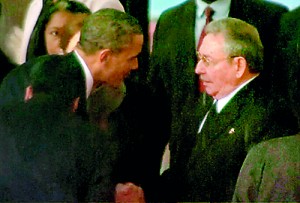Sunday Times 2
Behind Obama’s handshake with Raúl Castro
When President Obama shook hands with the Cuban President, Raúl Castro, on Tuesday, in the V.I.P. section at Nelson Mandela’s memorial, in Johannesburg, there was more at work than mere politeness between heads of state, although that certainly played a part. Bill Clinton shook Fidel Castro’s hand at a U.N. gathering in 2000. As the first African-American President of the United States, and an avowed admirer of Nelson Mandela since his youth, Obama has to know of the historic role played by Cuba in the anti-apartheid struggle.
After Angola gained independence from Portugal, in 1975, South African forces and their proxy troops fought to undermine the new,

Cuban soldiers training Anglo’s Marxist MPLA cadres
Marxist government. At the time, the Reagan Administration tacitly supported South African efforts to contain Communism in southern Africa. More than three hundred thousand Cuban troops, meanwhile, fought alongside the Angolans, until South Africa withdrew its troops, in 1988, following bruising battlefield reverses inflicted by the Cubans.
The South African troops’ drubbing at the hands of Cuban forces in Angola was, in historical terms, one of the key factors marking the beginning of the end for the country’s apartheid regime. No longer able to prevail militarily against the majority-black “frontline states,” South Africa retreated from the battlefield. There were other forces at work, too, including sanctions and the African National Congress’s own efforts within South Africa’s borders. But, one way or another, within two years the white regime in Pretoria was suing for a peaceful transition with Mandela, who had then been imprisoned for a quarter of a century. (When Mandela was arrested in 1962, the Bay of Pigs disaster was recent news.)
Mandela acknowledged the transcendental nature of Cuba’s support for the anti-apartheid cause when he flew there in July, 1991, a year after his release from prison, in one of his early trips abroad. He was hailed as a hero by Cubans, who crowded the streets to catch a glimpse of him, and standing alongside Fidel in a ceremony he thanked him for his commitment and said, “Cuba is our second home.” Fidel gave him the Order of Jose Marti medal. The relationship endured. When Mandela was sworn in as South Africa’s first black President, in 1994, Fidel was his specially invited guest. In the years since, Cuba has sent thousands of Cuban doctors to work in South Africa’s poor communities, part of a campaign of international outreach and influence that the island has conducted for decades.
Fidel, now eighty-seven, is too feeble to travel, and so Cuba is represented instead by his younger brother Raúl, a robust eighty-two-year-old, who formally succeeded him in office in 2008. As it happens, Raúl, the longtime head of Cuba’s revolutionary armed forces, helped to preside over the country’s military expedition to Angola.
It is the end of an era, clearly, as the giants of history pass and are replaced by more diminutive characters. At Mandela’s memorial, Jacob Zuma, the current South African President, a man with feet of clay, was roundly booed by his people. And Raúl Castro is certainly no Fidel. He has none of his older brother’s charisma, or his Roman countenance and revolutionary hauteur. He is also less

US President Barack Obama (L) shakes hands with Cuban President Raul Castro in this still image taken from a video courtesy of the South Africa Broadcasting Corporation. Reuters
stubbornly idealistic in character. Raúl has recently accelerated badly needed economic reforms and has initiated moves-albeit, in very embryonic forms-toward greater freedom of expression on the island. It seems unlikely that Raúl’s pragmatic changes will extend to a political glasnost, but change has definitely begun in Cuba. It has come no more slowly, in a sense, than it has in post-apartheid South Africa, where countless unreconstructed white racists live in prosperity alongside their still-impoverished former black victims but adhere, for survival’s sake, to the spirit of the new times.
In the United States, Obama, too, represents a new era, a post-ideological world and one of diminished expectations, but one also made better and fairer by Nelson Mandela. Obama himself is the benefactor of an epic political struggle that took place a generation and more ago, in which Mandela may have had a more directly positive role than some of the men who previously occupied the White House. Paradoxically, given the constraints remaining in their own country, the Castro brothers played a role, too. If handshakes are symbols of reconciliation, then it is historically fitting that Obama and Raúl Castro greeted one another Tuesday in Johannesburg’s FNB soccer stadium.
Fidel, for his part, has always been extremely proud of what he did in Angola and for the anti-Apartheid cause. Indeed, in a historical sense, amid countless policy gestures that were questionable, or far worse, it may well have been his finest hour.
Courtesy Newyorker.com


